What better motivation to get back to blogging than the delightful combination of Riz Ahmed and a moving exploration of deafness onscreen? I recently watched Sound of Metal again, exactly a year since I first saw it. There are many things that I found moving about the film. The main character’s experience with deafness is set against a nuanced backdrop of addiction, love for music, his deep relationship with his significant other/ bandmate, and each of their respective childhood traumas.
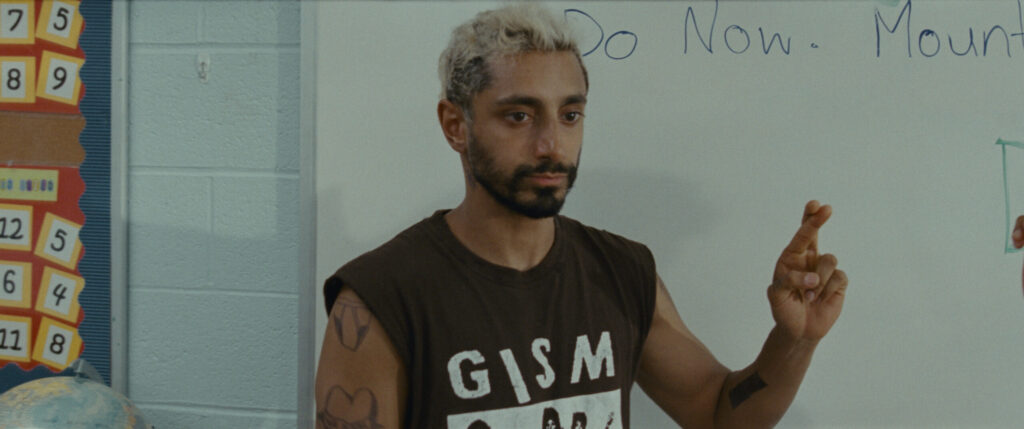
The emotional world of the film is so compelling and immersive. Yet some of the director’s choices in representation of deafness prevented the film from reaching its full potential. The choices and circumstances of Deaf versus hearing society were portrayed in an overly simplistic and binary manner. By not accurately or fully capturing the complexity of the Deaf experience, the film failed to fully capture the complexity of the hearing characters’ experience as well – because the intimate factors of healing, codependency versus interdependence, love, language, heritage, and home are universal.
I hope you enjoy this long review. I start with my recap of the plot, then summarize my main critique of the relationship outcome between Ruben and Lou and how it falls short from the perspective of someone like myself who learned sign for a loved one. I then get into Deaf community critiques of how the film represented the Deaf experience in an over-simplified and flattened manner. Finally, I circle back to what the film’s director got right in the process – ie, Riz Ahmed learning ASL and forging relationships with Deaf colleagues on set – and explain how that process/culture should have been applied to the plot and dialogue itself.
TL;DR: I’m salty that the film never suggests that the hearing main character could learn sign for the late-deafened main character. This oversight in language, love, and possibility seemed to set up a rigid binary between the Deaf and hearing worlds, just like the film sets up a rigid binary between codependency and independence. There’s a third path, which is interdependence: the joy and satisfaction of meeting our loved ones’ needs and collectively being stronger and better for it. I wish this path would have at least been shown, even if the characters could not or would not opt to take it.
How we save each other
Love or codependency? Codependency or independence? What about interdependence? At the center of “Sound of Metal” is the love story between Lou and Ruben. They are traveling the country in an Airstream trailer, performing together as the metal duo Blackgammon. We come to understand that she has a history of self-cutting and he has a history of addiction. They have been together for four years, since he got sober. In the last scenes, we learn that they saved each other’s lives at a time when they each needed someone to be their home.
The opening part of the film has a lovely scene of their morning routine, complete with a slow dance to big band on their record player. The Airstream sits in the middle of a spacious, sun-bleached parking lot – the emptiness of the concrete expanse contrasting so starkly with the rich world contained within the trailer. They are a world in and of themselves, traveling and performing together. But we start to see clues that they are holding each other back, or perhaps stagnating… at the beginning of the morning routine scene, the camera pans to a sleeping Lou and we observe the fresh marks of her ongoing “scratching.”
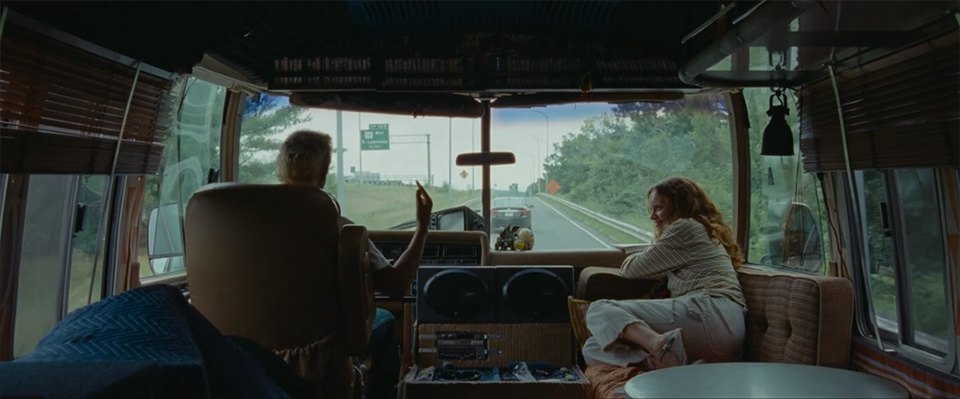
Ruben loses his hearing and their tour is interrupted. It becomes urgent to stop exposing him to noise, and also to find him a safe place to stave off addictive behavior under the stressful circumstances. His sponsor gets him a spot at a Deaf rehabilitation center in a lush green rural setting up the road from a state school for the Deaf. Upon their arrival, they learn that Ruben must stay alone in order to work on himself and learn sign language. After a difficult day of indecision and denial, they part ways. We later learn that Lou reunites with her father in Paris and starts to perform there; by the end of the film, we understand her to be flourishing in this new life.
Ruben also flourishes in his new life, after an initial period of resistance. He becomes fluent in sign language, makes friends, and becomes a beloved addition to the Deaf school. The director of the center offers him a permanent staff position. But Ruben keeps thinking about returning to Lou and their life together. Eventually he sells the Airstream and all his possessions to pay for cochlear implant surgery. Upon finding out, the director asks him to leave in a highly emotional scene that communicates profound betrayal: he explains that the community does not believe that deafness is something to be fixed, and takes offense to the surgical route. The director notably accuses Ruben of acting like an addict in his quest to get Lou and their life back.
I’m not sure whether we the viewers are supposed to agree with the director’s accusation of addictive behavior. It is clear that Ruben deeply loves Lou and needs some kind of closure after the sudden terms of their separation many months before: to me, that is reasonable and heartfelt, not addictive, and he deserves empathy from the center’s director, despite his critique of the cochlear surgery (more on this later in the review!). Ruben travels to Paris to show Lou he can hear now and ask her to come back, but when he brings it up, she starts to scratch her scars. They have a profound and dignified moment of mourning together when they realize that they must part ways. Ruben also observes Lou speaking French and singing with her father and his friends. The next day, Ruben leaves quietly while Lou is still asleep.
The end of the film is the archetype of letting someone go, someone who you still love, so that they can thrive without you. Accepting that you are no longer right for each other in that place and time, despite everything that you shared before. Their relationship was never portrayed as toxic: it was loving and necessary, but then it started to time out and could no longer meet Lou’s needs or give her the chance to fully resolve her past, as evidenced by her ongoing “scratching” during their time together. Letting each other go also means letting go of their music together: the metal that perhaps saved them as much as they saved each other must also be left behind, as Lou grows into a new chapter of music and identity.
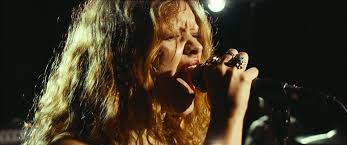
It is interesting that Lou’s return to her fatherland, to the home of her father, is also a kind of linguistic homecoming. We learn that she has not spoken French since she was a child, when her mother took her back to the United States. But the language has come back to her, and Ruben observes her to be well-adjusted and thriving. I’m not sure if this language component was intentional, but it is a striking parallel that they each gain or regain a linguistic identity in their separation from each other. And this is where we arrive at the shortcomings of the film that intersect with the purpose of this blog: our language identities are not mutually exclusive, as hearing people must learn sign for those we love.
Language, love, and identity
In the last part of the film that takes place in Paris, Ruben comes to terms with their separate lives as he comes to terms with the distorted, unnatural quality of the hearing he is finally able to access through the cochlear implant. We understand that he expected to regain something akin to his “natural” hearing through the surgery. One on one, the cochlear lets him hear well enough to have a conversation. But in the group setting of the busy birthday party for Lou’s dad, and when Lou is singing with her father as he plays the piano, the sound is layered into an intense cacophony of grating and unintelligible noise.
The inaccessibility of her life, their separate language worlds, feels like an analogy for the many ways in which they need to part from each other. But this is what bothers me so much, and makes me feel like the film portrays deafness in an overly binary manner. Ruben’s new world of sign language is not inherently excluding of Lou: they must go their separate ways because they are in different places in life, first and foremost. They must go their separate ways because she needs to reconnect with her father and the life she left behind as a child. Yes, that does involve speaking a language that Ruben does not know. And yes, his rehabilitation at the Deaf addiction center involved learning a language that Lou does not know. But, there is nothing inherently preventing them from learning each other’s languages.
Their separation must be seen as driven by their distinct healing journeys – not by the challenges posed by cross-cultural or cross-linguistic relationships – and I’m not sure that the film adequately clarifies that. As the parent of a Deaf child, I feel so strongly about learning languages for people we love. And I feel particularly strongly about the obligation to learn sign language for our Deaf family members and friends who cannot access spoken language: it is not a choice, it is our fundamental responsibility. Ruben and Lou are chosen family, and yet this possibility of learning sign for him never comes up even in passing.
The film treats the Deaf and hearing worlds as these two separate realms – underlined in the last scene when Ruben is sitting outside listening to the loud, grating clanging of the church bells. He removes his CI speech processor and headpiece and experiences silence with relief. This scene harks back to the grim encounter between Ruben and the director of the Deaf center, when the director basically kicks him out for getting a cochlear implant. The truth is that a Deaf person can fully identify with Deaf culture and American Sign Language, while also choosing and maintaining an implant… and this brings us to the next section of the review, where I will recap some of the Deaf and Hard of Hearing responses to the film.
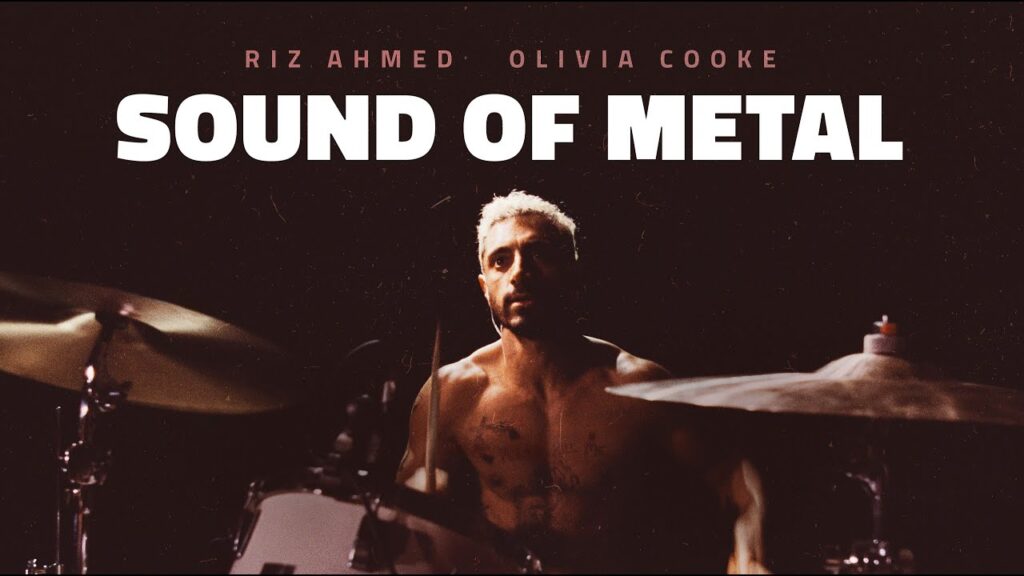
The bar is low…
I’m no film expert, but I generally have very little patience for movies and do not hesitate to turn one off if it is not scratching my itch for learning, feeling, or getting inspired. Sound of Metal was so emotionally immersive from its first scenes that I could tell it was worth seeing through, even though I had no idea what to expect from a disability perspective: I had seen a tagline for the film referencing hearing loss, but I did not take the time to read any other reviews or interviews prior to watching it.
I honestly had no idea that the film would actually show Deaf culture and community; I guess I assumed that we would be accompanying the main character on an experience of hearing loss that was situated in the hearing world, like basically a struggle for accommodation and acceptance within the music community or something? I think I assumed he would relearn to play music by vibration. Again, my expectations were pretty much situated within a framework of the upper limits of hearing people’s oralist accommodation of hard of hearing peers or late-deafened friends. It honestly did NOT occur to me that a film with a famous actor would actually include accurate sign language, Deaf cast members, and authentic Deaf culture.
It’s revealing for me to sit here and cross-examine my default expectations, because they show just how low the bar is for the representation of Deafness and disability in pop culture. Imagine that I have a Deaf child and experience with Deaf culture, but it did not even occur to me that a film about hearing loss would actually include sign language or Deaf community. Like I trained my brain that it is literally impossible to expect those things out of a film made for a mainstream audience, no matter how much I hold the filmmaker and actors in high regard. Now I understand why the subsequent release and recognition of the film CODA was so monumental, despite its own respective shortcomings.
Even after Ruben and his girlfriend Lou arrive at the rural healing center and a man who both speaks and signs comes out to greet him, I was still in denial. What did I expect? Probably a little bit of token sim-comming (signing over one’s spoken English) and no actual ASL. It wasn’t until the director then turns to another resident and communicates exclusively in American Sign Language that I let my brain relax into actually getting excited about the prospect of ASL being accurately used and represented as part of Deaf culture in the film.
There are many beautiful moments in that part of the film, and I could have spent the entire length of the movie – or multiple movies – just following the stories of the residents of the healing center, the students at the school, and the wider Deaf community in the area. My imagination made an entire cheesy subplot where Ruben and the teacher played by Lauren Ridloff fall in love. However, after reading Deaf reviews of the film, I realized that a number of shortcomings in the film prevent the average hearing audience member from reveling in those ASL scenes as I did, even when I could not understand all of the dialogue. In other words, I think my personal experience enabled me to supplement this part of the movie with my own social-emotional world and initially overlook its shortcomings.
These early scenes were not captioned because we are seeing the community through Ruben’s eyes, and he has not yet learned sign. But the drawback is that the Deaf characters are flattened for the hearing audience that does not know ASL. It is a tricky trade-off because, by giving us an authentic experience of Ruben’s language gap and language transition, the director deprived us of an authentic experience of the Deaf lives at the healing center and pushes them to the background. This choice was compounded by the fact that the film does not compensate by later developing those characters – more on this later.
Hearing audiences were moved by the film, and some Deaf commentators expressed that, despite its shortcomings, the film still served an educational purpose for the hearing mainstream by portraying Ruben’s isolation in hearing spaces so compellingly. Such responses from the Deaf and Hard of Hearing community show that people were gracious and open-minded, given the low bar for the representation of deafness on screen. Nevertheless, overall the responses were critical: in a piece for Vice i-D, journalist Shanti Escalante-De Mattei surveyed Deaf perspectives on social media and concluded that “Sound of Metal is just another reminder that they haven’t been allowed to tell their own stories.”
The Deaf community responds
The first critique pertains to casting. Both Ruben and the healing center’s director Joe were played by hearing actors. This was a bit of a gray area for the Deaf community: technically both characters are late-deafened, and therefore represent hybrid identity characters. Joe is therefore played by an actor named Paul Raci who is a “CODA” (child of Deaf adults), meaning he is a hearing person who grew up as a native signer. As for Riz Ahmed, the director had him spend eight months learning ASL from a well-known language coach named Jeremy Stone. However, many Deaf commentators nevertheless insisted that both of these roles could – and SHOULD – have been played by Deaf or Hard of Hearing actors, since so few such roles are available in the industry overall.
The second, and perhaps more important critique, pertains to how the Deaf characters played by Deaf actors were treated in the film. The Vice i-D piece quotes Jade Bryan, a Deaf filmmaker and founder of the #DeafTalent movement: “There was a Deaf cast, which is a good thing. However, I felt they were in the movie as a crutch to support a story about the main character.” Despite the inclusion of Deaf actors including Lauren Ridloff, Chelsea Lee, Shaheem Sanchez and Jeremy Lee Stone, all of these characters were minor: many online commentators pointed out that only one fellow resident of the healing center has a name, Jenn (Chelsea Lee), but we don’t learn much of her story other than a brief glimpse into her queer sexual identity when Ruben designs a naked lady tattoo at her request. Likewise, we are struck by the kindness of teacher Diane and her class of students, but we do not see anything of their own lives beyond that institutional setting.
So what we have in Sound of Metal is the compelling presence of a group of Deaf actors and native signers performing together, but largely without names and complex identities, and initially lacking even subtitles to translate the ASL. Because the film is supposed to give us Ruben’s perspective, the initial scenes at the healing center are not subtitled because he himself does not yet understand ASL. I could follow the gist of the conversations but I realized that the director’s strategy can easily backfire and cause the hearing viewer without any ASL background to check out or feel lost. Just because Ruben can’t yet understand the ASL being used around him doesn’t mean that the hearing viewer of the film should be completely deprived of understanding and appreciating the Deaf social dynamic at the center.
The third major critique pertains to how the film treated the topic of cochlear implants. On Twitter, Deaf cultural critic Ren lamented the aggressive binary promoted by the film, whereby Ruben had to choose between getting an implant and remaining in the Deaf community center (Joe even offers him a permanent position before he gets the implant). Ren wrote: “Why perpetuate that it’s either resigning yourself to an isolated world or being a traitor with cochlear implants? WE ARE SO BEYOND THIS ARGUMENT.”
Ren’s friend shared a screenshot of text messages that sum up many of the critiques shared here. The texts are written out in the paragraph below the image, for the convenience of Blind readers.
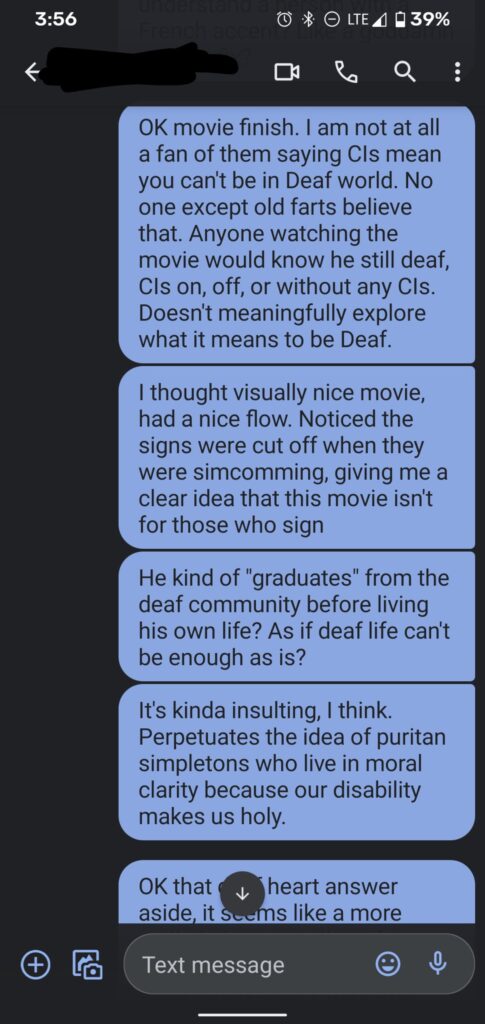
Ren’s friend writes: “Ok movie finish. I am not at all a fan of them saying CIs mean you can’t be in Deaf world. No one except old farts believe that. Anyone watching the movie would know he is still deaf, CIs on, off, or without any CIs. Doesn’t meaningfully explore what it means to be Deaf.” Next text continues: “I thought visually nice movie, had a nice flow. Noticed the way signs were cut off when they were simcomming, giving me a clear idea that this movie isn’t for those who sign.” Third text continues: “He kind of ‘graduates’ from the deaf community before living his own life? As if deaf life can’t be enough as is?” Last text reads: “It’s kinda insulting, I think. Perpetuates the idea of puritan simpletons who live in moral clarity because our disability makes us holy.”
It is striking to me that this brief series of texts encompasses such a broad and deep critique of the film that the majority of reviews completely overlooked. For example, the way that the ASL is cut off when voice is being used simultaneously, and how immediately obvious and offensive that was to a Deaf viewer. A review in the Georgetown Voice aptly summarized: “Sound of Metal is at once accessible and inaccessible. It is open captioned, meaning subtitles are burned into the actual film, yet several scenes contain muffled voices or ASL without captions.”
The comment about Deaf people being portrayed as “holy” or “puritan” is also striking, and did not occur to me while I was watching the film. Perhaps I myself was sucked into the romance and beauty of the healing center, where the lush greenery of the countrywide contrasts so starkly with the barren parking lots where Ruben and Lou were parking their Airstream while touring. The irony, other commentators pointed out, is that resources such as a fully-funded ASL language addiction program for Deaf community are rare. These are society-level critiques that a hearing audience member like myself is unlikely to recognize, and show once again how important it is to uplift the Deaf community’s opportunity to self-represent in film and media.
What was done right?
Despite all the critiques offered above, it should be acknowledged that the film was still groundbreaking in many ways. It is important to take the successful aspects and encourage them, even as we push the bar higher. I found it compelling to read about the personal journey and transformation of Riz Ahmed. Apparently director Eric Marder had spent years rejecting various actors for Ruben’s role, to the point that his script was a laughing stock amongst agents.
Riz Ahmed was the only one who was willing to “go all in,” and commit the eight months to learning American Sign Language with coach Jeremy Stone (who also plays the ASL teacher in the film). Marder said in an interview with the Hollywood Reporter: “Not everybody can do what Riz was able to do… Not just could but would. You need an immense amount of talent that Riz obviously has, but you also need a commitment to a process that I was interested in, which was unusual.”
Actor Chelsea Lee, who plays healing center resident Jenn, said that Ahmed’s commitment impressed Deaf colleagues and opened the door for relationships on and off set. The entire experience was obviously deeply transformative for Ahmed. He gained a newfound understanding and appreciation for Deaf culture, identity, and language. In an interview with magazine Men’s Health, Ahmed referenced the joke in the Deaf community that hearing people are emotionally repressed. He stated that his ASL sessions with Stone where like therapy, where he could become more expressive and stop holding so much in.
Ahmed also had a chance to reflect on “what it means for someone to derive a sense of purpose from outside of themselves,” as the Washington Post recounted of their interview with him. As a character, Ruben deals with compounding traumas that force him to give up his major romantic relationship and change the way he exists in the world. He has to let go of what he had, in order to appreciate what he has newly gained.
In all these ways, deafness was just one piece of the expansive human condition touched on by the film. Through his relationships on set and his ASL learning journey, Ahmed was able to gain a deeply nuanced grasp of how it all fits together, in a way that neither romanticized nor minimized the Deaf experience. However, what Ahmed got out of the role shows precisely where the film fell short: the audience was not able to get that same level of nuance for all the reasons explored in the review. And in our incomplete access to the Deaf experience, the treatment of the human condition in the film was also short-changed.
Going the distance for loved ones
In my personal life, I have learned American Sign Language for my daughter. More recently, I have moved to a new state just for her to access better school options, then done everything I could to stay even when it limited my job prospects and required me to rebuild my own community. Able-bodied people make many such choices to stay with our disabled loved ones, or to move with them to places where they can better access services. We advocate and “accommodate” because we are family, we are community, and we are interdependent.
I put “accommodate” in quotes because the mainstream concept seems to imply giving something up, or being inconvenienced, or providing someone with the bare minimum of what they need to join the able-bodied or hearing world. The truth is that we all gain by meeting each others’ needs, and we all gain by creating a world together. We hearing and able-bodied family members gain so much by joining the worlds of our disabled and Deaf loved ones, as Riz Ahmed has articulated so clearly in his many interviews on his experience acting in Sound of Metal.
The emotional codependency and language barriers that contextualize the permanent separation of Lou and Ruben are therefore not static conditions, despite their uncritical representation as such in the film. In another outcome to the film, the main characters could have grown through these changes in their lives and healed together. Lou could have chosen to learn sign language and rejoin Ruben in the setting of the Deaf healing center. But this was never presented as a possibility, given the dearth of Deaf character development contrasted with the vibrant world of her reunion with her father in Paris. The uncritical privileging of biological family over chosen family, of the rich father over the broke and disabled lover, further reinforces the ableism that the film seems to passively endorse.
What would I have changed, exactly? In addition to the many critiques shared above – regarding Deaf character development, accessibility, casting, and the hardline position on cochlear implants – I would have changed certain scenes to raise this question of learning ASL for loved ones. I might have added some kind of dialogue into Ruben’s relationships in the Deaf community: maybe the topic of a loved one learning ASL could have been brought up by Jenn when they are going through the RV together and she sees photos of Lou. I believe she comments that Lou is “sexy” or something like that, but she doesn’t ask further questions about their relationship, if they will stay together, and so on. The connection between Ruben and Jenn is portrayed on very simple terms, in part because of Ruben’s still limited sign language, but a simple question like, “Do you think she will learn sign for you?” or perhaps a passing story from another character whose hearing loved ones did NOT learn sign for them could have shed light on this dimension of the Deaf experience that plays a role in Ruben’s love life.
In the final scenes between Ruben and Lou, the topic could have likewise been broached. Maybe, at the very least, Lou could have asked about his sign language journey in the scene where she is checking out his cochlear and talking to him. Perhaps he could have slipped into sign language or simcomming, and it would have spurred her to ask him about it. There are many ways in which they could have acknowledged the language issue in the final scenes. It is striking that he comments on her speaking French again, but she does not comment in any way on his ASL journey. It’s like that new part of himself is invisible to her, even though she saw Joe signing when she left Ruben at the center.
While one might argue that this represents a reality in the Deaf community – that so many hearing friends and family do not understand or make the effort to sign – the film could have made this critique explicit by somehow raising the topic in the final scenes. Either Lou would have offered to learn sign, or mentioned the possibility, therefore raising the bar for hearing people and showing that we need to do that for people we love (even if Lou and Ruben parted ways regardless, for other reasons). Or the film would have made it clear that her lack of acknowledgement of his language needs was disappointing and a double-standard considering his willingness to get a cochlear implant and fly to France.
This brings me back to the director’s comment about Ruben’s “addictive” behavior towards Lou: he loves her, and he is willing to go the distance to see if they can make it together. His efforts are ultimately misguided, because he should not need to get a cochlear implant to keep a loved one in his life. But why wouldn’t Lou be theoretically willing to make some effort herself, and why couldn’t the film have somehow defined the required effort as learning American Sign Language? Ultimately, I would have liked to see this film explore the possibility of INTERDEPENDENCE between disabled and able-bodied loved ones, instead of forcing everything into a binary between bad codependency and good independence seemingly analogized by the uncritical representation of their separation into Deaf and hearing worlds. Yes, Deaf community and identity is to be protected and promoted – not fixed. But also, hearing people should meet our Deaf loved ones there where they are, in their world, and we have so much to gain by continually striving to do so.
Thank you for reading!
With much love, -Sara
